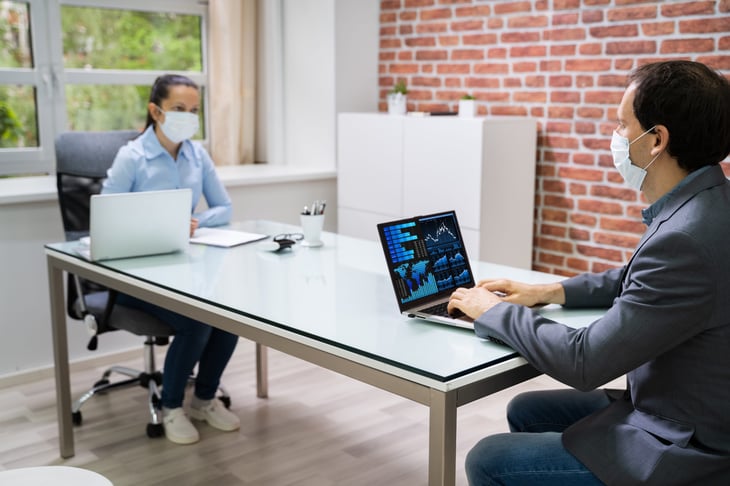
This story originally appeared on FlexJobs.com.
No matter why you’re looking for a new job, job hunting during the coronavirus pandemic is unique. Instead of attending in-person networking events, you’re likely attending virtual job fairs and tapping your network online.
Whatever you’re doing, though, it’s finally paid off. You’ve got a job interview!
And while you’re prepared for the fact that it will probably happen online, you’ll want to be prepared for pandemic-related interview questions, too.
Like any interview, you know to expect the “typical” questions: “Tell me about yourself.” “What are your strengths and weaknesses?” “Why did you apply for the job?” You are, of course, prepared for these questions.
In some interviews, you might also encounter some curveball questions. These could be as simple as “Tell me about a time when …” and you have to give an example of when you solved a problem at work.
However, a pandemic presents everyone with challenges and opportunities. Employers are using this historic time to assess how you face a crisis, and how well you pivot. In a sense, they are asking, did you make lemons out of lemonade? And if so, how?
We spoke with FlexJobs career coach Tracy Capozzoli and gathered her tips for answering some pandemic-focused questions that you might encounter as you interview for new jobs during the COVID-19 pandemic.
How have you been managing yourself during this time, and how have you been staying proactive?

Employers are trying to find out how you balance your professional life with your personal life. Both likely changed considerably, so what have you done to manage everything?
How did you pivot and stay connected to your job? Or, if you lost your job, what did you do in the meantime?
No matter your situation, focus on the positives, not the negatives. For example, many people were thrown into remote work but didn’t know how to use virtual collaboration tools. Talk about how you worked to become a better remote employee.
Did you learn how to use Zoom more effectively? Did you master Slack or GoToMeeting?
If you’re unemployed, explain what you’ve been doing to improve your skills and stay connected to your field. “Mention any self-study and professional development you did. Since most of it was probably online, what webinars, podcasts, or free tutorials did you do?” Capozzoli says.
Can you or have you worked remotely?

The pandemic radically altered the work world. Many companies that were completely in-office shifted to entirely remote. Whether or not a company remains remote is not what matters, though, when it comes to your work-from-home experience.
“Employers have discovered that people with remote work experience have an easier time coming into a new position,” Capozzoli points out.
If you found yourself working remotely due to the pandemic, discuss your ability to thrive in a remote environment. “Emphasize your ability to meet and, at times, exceed your goals and objectives and explain how you did that.”
But if your job was never remote, that doesn’t mean you don’t have remote work experience. Many positions require remote work skills, no matter how informal. For example, if you worked for a large company with satellite offices in other time zones, talk about how you collaborated with team members in these offices to meet goals.
How do you organize your day when working from home?

Even though work flexibility is a huge benefit of remote work, that doesn’t mean that structure isn’t a necessity.
The best remote workers are self-disciplined and still follow a routine. You’ll want to make it clear that you can still achieve high performance in a virtual setting.
Will you be okay returning to a physical office when it’s safe?

Hopefully, the job posting was upfront about the position’s location. Some jobs are going to be remote forever. Others may only be remote during the pandemic.
And some companies may want staff back in the office as soon as possible.
Capozzoli advises job seekers to be honest about their feelings no matter what they are.
“Being honest with a potential employer is important. If you are comfortable returning to a physical office environment, reiterate to the employer that you would support their health and safety protocols when in a physical location,” Capozzoli says.
“However, if you are not comfortable returning to in-person work, it is best to be honest regarding your preference to work remotely,” she adds.
How do you communicate with team members in a remote setting?

Give specific examples about how you’ve collaborated with team members to hit goals, and what the impact was.
For example, have you created reporting dashboards that keep key stakeholders in the loop about performance, or have you utilized project management systems to manage deadlines? Do you send weekly updates to management about progress?
On the flip side, most people have experienced significant changes to their schedules during this time, requiring employers to be flexible with their working hours. Be sure to mention how you’ve notified your boss of this while maintaining productivity.
Demonstrating your ability to proactively communicate and understand accountability is critical.
Ask: How will training proceed, and what tools will you provide if I have to work from home?

At the end of an interview, the tables are usually turned, and you get to ask the questions. Like the interviewer, you may want to ask some pandemic-specific questions to help you decide if this is the right job and company for you.
The fact is the pandemic has altered the hiring and onboarding process. “Employers need to be clear about their training and onboarding procedures,” Capozzoli warns. Knowing what their procedures are or how the pandemic has altered them is essential for setting expectations for both you and the employer.
“Be sure to inquire about the equipment they may provide, remote collaboration tools they use and training they give to staff. Also, ask about communication expectations among teams, and what an average day or week looks like right now,” she says.
Employers should be able to answer these questions clearly. If they can’t answer them, the company may not be able to support your needs as a new hire.
Ask: What lessons has the company learned from COVID-19?

When COVID-19 forced many employers’ hands in March, some handled the transition better than others. Capozzoli says that it’s important to find out where a company succeeded, where it failed and what it plans to change.
“Employers should be able to identify where improvements were needed in their contingency plans,” Capozzoli says. More importantly, though, an employer should be willing and able to discuss these plans openly with you.
“Being able to discuss this with you as a potential employee is important. Employers should alleviate fears and demonstrate to candidates that they are dedicated to employee health and safety,” she says. “If you find an employer cannot answer this question clearly, you may have to decide if the employer is a fit for you and your comfort level during this time.”
Ask: Have the company’s views on remote work changed? How?

This question can help you gauge the employer’s comfort with continued remote work, assuming that they weren’t already remote.
Employers who are comfortable with or even embracing remote work should be able to discuss the benefits and their long-term plans for remote work.
“Those that are still adjusting may not have clear answers,” Capozzoli says. “Use this moment to determine your comfort level with ambiguous answers.”
Ask: If there is one, what is the “return to office” plan? How will you keep staff safe?

Plans are always a great idea. But, when something comes along and changes them, how does the company react? “Employers may convey that the timetable for returning to the office is flexible and may change based on local guidelines,” explains Capozzoli.
While a lack of some clarity may be OK (the company is taking it day by day, for example), an unwillingness to discuss the plan or not having the outline of a plan may indicate that the company is not ready to pivot should things need to.




Add a Comment
Our Policy: We welcome relevant and respectful comments in order to foster healthy and informative discussions. All other comments may be removed. Comments with links are automatically held for moderation.